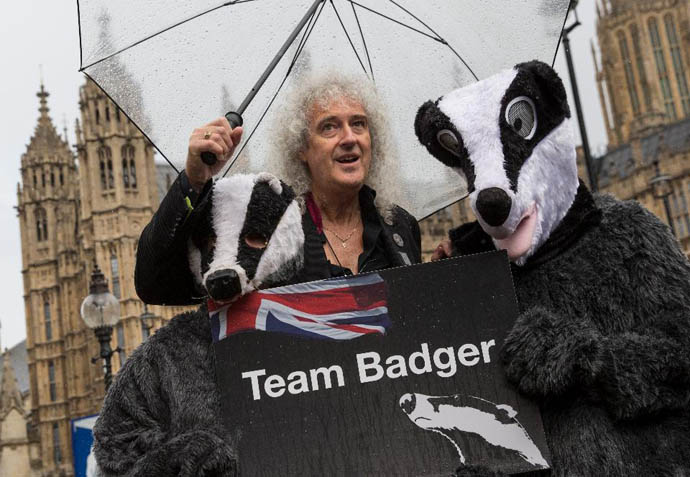SEE ALSO BRIAN’S COMMENT ON SOAPBOX
FORBES.com
26 Jul 2016 by Melinda Newman
Opinions expressed by Forbes Contributors are their own.
In the case of Queen vs. the RNC, it turns out that Queen can rightfully proclaim, “We are the champions.” Plus, we may see more changes coming forward that allow songwriters more control over how their music is used.
After Forbes published this story last week about why Queen could not stop the RNC from playing “We Are The Champions” as Donald Trump appeared out of the fog, a number of other songwriteres and artists, including The Rolling Stones, The O’Jays and Earth, Wind & Fire, vociferously objected via Twitter and FB about “unauthorized” use of their music at the RNC convention.

LONDON, ENGLAND – JULY 12: Former Queen guitarist and campaigner Brian May poses with people dressed as Badgers during a photocall on July 12, 2016 in London, England. The event was organised to ‘urge’ the government to abandon their planned Badger Cull which is to be rolled out in the Autumn. (Photo by Dan Kitwood/Getty Images)
The problem (for them) was that is was not, technically, unauthorized. The RNC had procured all the necessarily licenses from performing rights organizations ASCAP, BMI, and SESAC that allowed the RNC public performances of such recorded songs in that setting.
However, by shining such a light on a very misunderstood and complicated issue, the music creators may be leading PROs to take greater action. It looks like the PROs have heard their members’ complaints and are giving the issue a second look and in some cases taking action. (A number of artists, including Usher, Sheryl Crow, Josh Groban and Cyndi Lauper, came together to record a little ditty about their songs being used without their permission for this funny segment from Sunday’s “Last Week Tonight,” but even they didn’t get all the nuances right.)
After Queen’s complaint, its PRO, BMI, decided to utilize its Political Entities license clause. “As a way to protect our affiliates, the BMI Political Entities license has a provision that permits BMI to exclude any musical work from the license at the request of a BMI songwriter or publisher,” says BMI’s SVP of licensing Mike Steinberg. “Once the songwriter or publisher voices an objection to BMI, we alert the campaign that we have removed the song from the license.”
Last week, BMI sent letters to the Trump campaign and to the RNC, detailing Queen’s objections and asked them to sign its Political Entities license. By doing so, they acknowledge that Queen’s music is no longer part of BMI’s blanket license and the campaign can no longer use it.
RNC signed the license, but a BMI spokesperson did not know if Trump’s campaign had signed, and, furthermore, it’s unclear what happens if the RNC violates the agreement by playing the Queen’s music again, but the RNC can no longer claim that Queen’s music was included in its blanket license and, therefore, among the list of available songs. (We asked Queen’s Brian May to comment, but he declined).
Furthermore, Steinberg tells Forbes that the PRO is going to look how it can invoke the license down the road, even though, at this point, songwriters aren’t able to “opt out” of a specific license type preemptively. “The current sensitivities surrounding the Political Entities license ensure we are going to be looking at this more closely in advance of the next election cycle to determine if such a mechanism would be feasible and permissible within the constraints of our consent decree,” he says.
Following the RNC, ASCAP (whose members include the Rolling Stones) is directing its songwriters—and political campaigns— to a guide on its website that walks through the issue and what is and isn’t allowed, but stresses that campaigns should take the extra step of asking permission. “
Even with the proper PRO licenses, songwriters may have other cause to object to the use of their songs being heavily identified with a political candidate or cause,” says Vincent Candilora, ASCAP’s EVP of licensing. “That’s why, we strongly encourage campaigns, especially if they plan to use popular songs as theme songs for a candidate, it would be in their own best interest to obtain permission, to avoid negative media coverage and to minimize the risk of violating other laws.”
The “violating other laws” is where it gets even more complicated. After last week’s story, some lawyers brought up the “right of publicity” law, a provision by which many states provide image protection for famous people or artists, as well as the Lanham Act, which covers the dilution of a band or artist’s trademark through an unauthorized use. The problem is that both of these are untested as far as campaign usages since no artist or songwriter seems to have ever taken a case to trial citing a violation by a campaign—or at least as far as we could find. That’s probably in part because of the expense and that the usages are usually very short lived, plus, as Candilora points out, “our experience has been that when a songwriter publicly objects to the use of a song by a campaign, generally, the campaigns comply with the request.” (These usages do not cover campaign commercials, for which permission must be granted by the copyright and master owners).
As the DNC continues this week, it will be interesting to see if any of its music usages provoke similar ire from artists and songwriters, but we doubt that this is an issue that is going away any time soon.